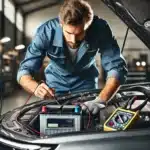Imagine setting sail into the sunset, confident that your vessel’s battery will last as long as your adventure.
Table of contents
That’s the peace of mind a deep cycle marine battery offers to seafarers. Unlike regular batteries, deep cycle marine batteries are designed to provide reliable, sustained power for prolonged periods, making them an indispensable component of any serious boating or marine activity.
In this guide, we’ll explore what makes deep cycle marine batteries a staple in the maritime world.
What is a Deep Cycle Marine Battery?
A deep cycle marine battery is engineered to discharge most of its capacity and reliably provide power over extended periods. This type of battery is ideal for marine applications because it can withstand repeated draining and recharging cycles without losing efficiency.
Key Features

1. Robust Design
Tailored to endure harsh marine environments with corrosion-resistant materials.
2. Thick Plate Construction
Allows for deep discharges with minimal wear and tear.
3. Vibration Resistance
Keeps performance steady despite the constant movement of the sea.
Design Features Tailored for Marine Use
Deep cycle marine batteries come in various types, each suited for different marine needs:
1. Flooded Lead-Acid Batteries
These are often the most economical choice but require regular maintenance to check and refill the electrolyte levels.
2. AGM (Absorbed Glass Mat) Batteries
These are sealed, maintenance-free batteries known for their durability and ability to withstand frequent deep cycling.
3. Gel Batteries
Similar to AGM, gel batteries offer excellent deep cycle capabilities and are perfect for situations where maintenance access is difficult.
4. Lithium-Ion Batteries
Though more expensive, they provide the best longevity and efficiency, handling deep discharges better than other types.
Learn about 12V deep cycle batteries.
Advantages of Deep Cycle Marine Batteries
The benefits of using deep cycle marine batteries in your boat or maritime equipment are significant:
1. Dependable Power Supply
They ensure a constant energy flow for longer durations, crucial for powering marine electronics, trolling motors, and other onboard accessories.
2. Durability
Built to last through extreme marine conditions, including exposure to salt air and rough waters.
3. Low Maintenance
Especially with AGM and Gel types, which do not require regular fluid checks or other traditional battery maintenance.
Right Deep Cycle Marine Battery Marine Needs

Choosing the correct deep cycle marine battery involves considering several factors:
1. Capacity
Measured in ampere-hours (Ah), capacity determines how much power the battery can store and deliver over a specific period.
2. Size and Weight
Important to consider based on the space available on your boat and the weight it can handle.
3. Type of Vessel
The size and type of your vessel will dictate the power requirements and thus influence the choice of battery.
Maintenance Tips to Extend Marine Battery Life
Proper maintenance not only extends the life of your deep cycle marine battery but also ensures it performs optimally:
1. Regular Cleaning
Keep terminals clean and free from corrosion.
2. Proper Charging
Use a suitable charger and avoid overcharging, which can shorten the battery’s lifespan.
3. Storage
When not in use, store the battery in a cool, dry place and ensure it’s charged periodically.
Frequently Asked Questions
Can deep cycle marine batteries be used for starting engines?
While possible, it’s not recommended as deep cycle batteries are optimized for prolonged discharge at lower rates.
How often should I replace my deep cycle marine battery?
With proper care, deep cycle batteries can last 4 to 6 years or more.
What is a deep cycle marine battery lithium?
A lithium deep cycle marine battery is a high-performance energy storage solution designed specifically for the demanding conditions of marine environments. Unlike traditional lead-acid batteries, these lithium-ion batteries are engineered to handle deep discharge cycles repeatedly, making them ideal for applications that require a consistent and reliable power source over extended periods.
Advantages of Lithium Marine Batteries
Deep cycle marine batteries made with lithium technology offer several distinct advantages. First and foremost, they have a much higher energy density, which means they can store more energy than lead-acid batteries of the same size. This makes them incredibly efficient and space-saving—critical benefits for use in marine vessels where space is often at a premium. Additionally, lithium marine batteries are significantly lighter than their lead-acid counterparts, contributing to better fuel efficiency and easier handling of the vessel.
Longevity and Efficiency
Another significant advantage is their lifespan. Lithium deep cycle marine batteries can typically endure more charge and discharge cycles before their capacity falls to an unusable level. This longevity means fewer battery replacements and reduced long-term costs, despite the higher initial investment. They also charge faster and maintain their voltage throughout the discharge cycle, ensuring that marine electronics and other equipment function effectively until the battery is nearly depleted.
Safety and Maintenance
Safety and maintenance are further enhanced in lithium marine batteries through built-in Battery Management Systems (BMS). These systems protect the battery from common hazards such as overcharging, deep discharging, and overheating, ensuring stable and safe operation.
What is a Deep Cycle Marine Battery used for?
A deep cycle marine battery is specifically designed for prolonged use, making it ideal for various marine applications where consistent power over long periods is necessary. Here are some common uses:
1. Solar Energy Storage
In boats equipped with solar panels, deep cycle batteries store the energy collected, allowing for power usage when solar energy is not available.
2. Trolling Motors
Deep cycle marine batteries provide the sustained energy required for trolling motors on fishing boats, allowing for extended periods of slow and controlled propulsion.
3. Onboard Electronics
They power a wide range of electronic devices on boats, including navigation systems, fish finders, radios, and GPS units, ensuring these systems remain operational throughout long trips.
4. Lighting
Essential for powering cabin lights, deck lights, and navigational lights, which are crucial for safety and functionality during nighttime or low-light conditions.
5. Auxiliary Power
They are used to supply power to secondary systems such as bilge pumps, winches, and other electrical equipment that may be needed during marine operations.
Deep Cycle Battery Voltage Chart
| State of Charge (%) | Voltage (V) |
|---|
| 100% | 12.70 |
| 90% | 12.50 |
| 80% | 12.42 |
| 70% | 12.32 |
| 60% | 12.20 |
| 50% | 12.06 |
| 40% | 11.90 |
| 30% | 11.79 |
| 20% | 11.58 |
| 10% | 11.31 |
| 0% | 10.50 |
Deep Cycle Battery Discharge Chart

What is a deep cycle marine battery lithium?
A deep cycle marine battery made from lithium typically refers to a lithium-ion battery designed specifically for marine applications. These batteries are built to handle deep discharge cycles more efficiently than traditional lead-acid batteries, making them ideal for powering heavy-duty marine electronics, trolling motors, and other onboard equipment that requires sustained power delivery.
Characteristics of Lithium Deep Cycle Marine Batteries
Chemistry
The most common type used in marine settings is Lithium Iron Phosphate (LiFePO4). This chemistry offers a good balance of safety, energy density, and cycle life. It is less prone to thermal runaway compared to other lithium-ion chemistries, making it safer for use in confined marine environments.
Efficiency
Lithium marine batteries provide a higher depth of discharge (DoD) than lead-acid batteries. They can often be discharged up to 80-100% of their capacity without significant degradation, unlike lead-acid batteries, which are typically limited to 50% DoD for optimal lifespan.
Weight
They are significantly lighter than lead-acid batteries, which is a critical benefit in marine applications where weight can affect fuel efficiency and stability.
Longevity
Lithium marine batteries generally have a longer lifespan, capable of thousands of charge-discharge cycles compared to the hundreds typically offered by lead-acid batteries.
Maintenance
These batteries are virtually maintenance-free, requiring no regular watering or specific gravity checks as in lead-acid batteries.
Cost
Initially, lithium marine batteries are more expensive upfront, but their longer lifespan and reduced maintenance needs can make them more cost-effective over time.
Conclusion
The deep cycle marine battery is your boat’s silent sentinel, powering your marine journeys with reliability and endurance. Understanding the different types available and their specific benefits will help you make an informed decision that ensures your marine adventures are powered smoothly and reliably.
How to Charge a Deep Cycle Battery?
FAQs
What is the difference between deep cycle marine batteries and regular car batteries?
Deep cycle marine batteries are designed to provide a steady amount of power over a longer period, making them ideal for applications where sustained energy is needed, such as powering onboard electronics and appliances. In contrast, regular car batteries are built to deliver a quick burst of energy to start the engine and are not designed for prolonged discharge. This fundamental difference in design means that deep cycle batteries can withstand repeated draining and recharging cycles without losing efficiency, while regular car batteries can suffer damage if discharged too deeply.







